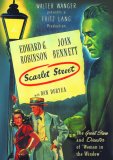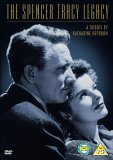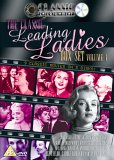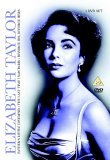![The Woman In The Window [1944]](/pictures/1090199.jpg) The Woman In The Window | DVD | (12/01/2009)
from £N/A
| Saving you £N/A (N/A%)
| RRP
The Woman In The Window | DVD | (12/01/2009)
from £N/A
| Saving you £N/A (N/A%)
| RRP The Woman In The Window
![Father's Little Dividend [1951]](/pictures/1012095.jpg) Father's Little Dividend | DVD | (26/01/2004)
from £4.97
| Saving you £0.02 (0.40%)
| RRP
Father's Little Dividend | DVD | (26/01/2004)
from £4.97
| Saving you £0.02 (0.40%)
| RRP Reprising his role from the 1950 release 'Father Of The Bride' Spencer Tracy rejoins Joan Bennett Elizabeth Taylor and Don Taylor in a charming sequel. Tracy portrays Elizabeth Taylor's father Stanley Banks who is still recovering from the effects of giving up his ""little girl"" Kay to Buckley Dunstan played by Don Taylor. Upon hearing the news that the newlyweds are expecting Tracy opposes the new arrival feeling the stresses of middle age and family life but he eventual
 Scarlet Street | DVD | (06/11/2006)
from £15.13
| Saving you £-10.14 (N/A%)
| RRP
Scarlet Street | DVD | (06/11/2006)
from £15.13
| Saving you £-10.14 (N/A%)
| RRP  3 Leading Ladies Of The Silver Screen - Vol. 1 - Father's Little Dividend / Nothing Sacred | DVD | (04/10/2004)
from £4.99
| Saving you £N/A (N/A%)
| RRP
3 Leading Ladies Of The Silver Screen - Vol. 1 - Father's Little Dividend / Nothing Sacred | DVD | (04/10/2004)
from £4.99
| Saving you £N/A (N/A%)
| RRP Father's Little Dividend: Reprising his role from the 1950 release 'Father Of The Bride' Spencer Tracy rejoins Joan Bennett Elizabeth Taylor and Don Taylor in a charming sequel. Tracy portrays Elizabeth Taylor's father Stanley Banks who is still recovering from the effects of giving up his ""little girl"" Kay to Buckley Dunstan played by Don Taylor. Upon hearing the news that the newlyweds are expecting Tracy opposes the new arrival feeling the stresses of middle ag
 Father Of The Bride / Boy's Town / The Old Man And The Sea | DVD | (31/10/2005)
from £N/A
| Saving you £N/A (N/A%)
| RRP
Father Of The Bride / Boy's Town / The Old Man And The Sea | DVD | (31/10/2005)
from £N/A
| Saving you £N/A (N/A%)
| RRP Three classic Spency Tracy films are featured on this fabulous box set. Father Of The Bride: The comic trials and tribulations that beset a family mostly the father prior to their daughter's wedding day. Taylor and Tracy give wonderful performances and it's easy to understand why this was remade in 1991. The colorized version doesn't add much. Academy Award Nominations: 3 including Best Picture Best Actor-Spencer Tracy Best Screenplay. Boy's Town: ""Boys Town"" is a
![Suspiria [1976]](/pictures/1048556.jpg) Suspiria | DVD | (23/10/2006)
from £N/A
| Saving you £N/A (N/A%)
| RRP
Suspiria | DVD | (23/10/2006)
from £N/A
| Saving you £N/A (N/A%)
| RRP Inspired by Thomas De Quincey's 'Suspiria de Profundis' and co-written by Argento and his long-term partner Daria Nicolodi SUSPIRIA is Argento's undisputed masterpiece of Grand Guignol horror hitting new peaks of terror through its stunning photography (courtesy of Luciano Tovoli) eye-popping production design and terrifying atmosphere of dread - thanks in no small part to the great score from Goblin! Susy Banyon (Jessica Harper) is an American ballet student travelling to Germany to study at an exclusive dance academy in the Black Forest. After one of the students and her friend are hideously murdered in the first of Argento's breath-catching set-piece killings Susy discovers that the academy has a bizarre history and as the body count rises she gets involved in a hideous labyrinth of murder black magic and madness...
 Belonging | DVD | (13/09/2004)
from £N/A
| Saving you £N/A (N/A%)
| RRP
Belonging | DVD | (13/09/2004)
from £N/A
| Saving you £N/A (N/A%)
| RRP Jess is a happily married woman with a heart of gold whose husband Jacob the town's local handyman is Mr Dependable. They live in an idyllic house on the riverbank with Jacob's elderly mother May her sister Brenda as well as Nathan Jacob's elderly widowed cousin. Jess is kind and caring and enjoys taking care of them all. Into this content although unexciting life something is about to happen that will blow Jess's world apart. She is forced to question the entire meaning of her
![Scarlet Street [1946]](/pictures/1012866.jpg) Scarlet Street | DVD | (18/03/2002)
from £14.98
| Saving you £1.01 (6.74%)
| RRP
Scarlet Street | DVD | (18/03/2002)
from £14.98
| Saving you £1.01 (6.74%)
| RRP In a way, Scarlet Street is a remake. It's taken from a French novel, La Chienne (literally, "The Bitch") that was first filmed by Jean Renoir in 1931. Renoir brought to the sordid tale all the colour and vitality of Montmartre; Fritz Lang's version shows us a far harsher and bleaker world. The film replays the triangle set-up from Lang's previous picture, The Woman in the Window, with the same three actors. Once again, Edward G Robinson plays a respectable middle-aged citizen snared by the charms of Joan Bennett's streetwalker, with Dan Duryea as her low-life pimp. But this time around, all three characters have moved several notches down the ethical scale. Robinson, who in the earlier film played a college professor who kills by accident, here becomes a downtrodden clerk with a nagging, shrewish wife and unfilled ambitions as an artist, a man who murders in a jealous rage. Bennett is a mercenary vamp, none too bright, and Duryea brutal and heartless. The plot closes around the three of them like a steel trap. This is Lang at his most dispassionate. Scarlet Street is a tour de force of noir filmmaking, brilliant but ice-cold. When it was made the film hit censorship problems, since at the time it was unacceptable to show a murder going unpunished. Lang went out of his way to show the killer plunged into the mental hell of his own guilt, but for some authorities this still wasn't enough, and the film was banned in New York State for being "immoral, indecent and corrupt". Not that this did its box-office returns any harm at all. On the DVD: sparse pickings. There's an interactive menu that zips past too fast to be of much use. The full-length commentary by Russell Cawthorne adds the occasional insight, but it's repetitive and not always reliable. (He gets actors' names wrong, for a start.) The box claims the print's been "fully restored and digitally remastered", but you'd never guess. --Philip Kemp
![Father's Little Dividend [1951]](/pictures/1011996.jpg) Father's Little Dividend | DVD | (15/03/2004)
from £6.41
| Saving you £-4.42 (N/A%)
| RRP
Father's Little Dividend | DVD | (15/03/2004)
from £6.41
| Saving you £-4.42 (N/A%)
| RRP Having finally accepted that his daughter is married Stanley Banks (Spencer Tracy) has now to deal with the news that she is pregnant! The news leads to a dispute between both the maternal and paternal grandparents... A sequel to Father Of The Bride which also starred Spencer Tracy and Joan Bennett.
![Margin for Error & A Royal Scandal [1943]](/pictures/1080099.jpg) Margin for Error & A Royal Scandal | DVD | (31/03/2008)
from £N/A
| Saving you £N/A (N/A%)
| RRP
Margin for Error & A Royal Scandal | DVD | (31/03/2008)
from £N/A
| Saving you £N/A (N/A%)
| RRP Two classic Otto Preminger titles together in one package. A Royal Scandal dwells on a fictional incident in the life of Russia's Catherine The Great. This story of sexual shenanigans among royalty stars Tallulah Bankhead in a rare screen role. Also of note is a deliciously camp appearance by Vincent Price as the French Ambassador. Margin For Error stars Milton Berle as a Jewish Brooklyn policeman assigned to guard Nazi consul Karl Baumer (Otto Preminger) in pre-WWII New York.
 The Son Of Monte Cristo | DVD | (12/02/2008)
from £8.55
| Saving you £-5.56 (N/A%)
| RRP
The Son Of Monte Cristo | DVD | (12/02/2008)
from £8.55
| Saving you £-5.56 (N/A%)
| RRP ![Father's Little Dividend [1951]](/pictures/1012577.jpg) Father's Little Dividend | DVD | (10/03/2003)
from £3.99
| Saving you £N/A (N/A%)
| RRP
Father's Little Dividend | DVD | (10/03/2003)
from £3.99
| Saving you £N/A (N/A%)
| RRP Reprising his role from the 1950 release 'Father Of The Bride' Spencer Tracy rejoins Joan Bennett Elizabeth Taylor and Don Taylor in a charming sequel. Tracy portrays Elizabeth Taylor's father Stanley Banks who is still recovering from the effects of giving up his ""little girl"" Kay to Buckley Dunstan played by Don Taylor. Upon hearing the news that the newlyweds are expecting Tracy opposes the new arrival feeling the stresses of middle age and family life but he eventual
![Man Hunt [DVD]](/pictures/1141245.jpg) Man Hunt | DVD | (20/03/2017)
from £26.98
| Saving you £N/A (N/A%)
| RRP
Man Hunt | DVD | (20/03/2017)
from £26.98
| Saving you £N/A (N/A%)
| RRP  Colonel Effingham's Raid | DVD | (01/09/2003)
from £10.99
| Saving you £-7.00 (N/A%)
| RRP
Colonel Effingham's Raid | DVD | (01/09/2003)
from £10.99
| Saving you £-7.00 (N/A%)
| RRP ![Tai-Pan [1986]](/pictures/1017967.jpg) Tai-Pan | DVD | (08/10/2001)
from £19.30
| Saving you £-9.31 (N/A%)
| RRP
Tai-Pan | DVD | (08/10/2001)
from £19.30
| Saving you £-9.31 (N/A%)
| RRP ![hugh hefner - playboy, activist and rebel [DVD]](/pictures/1111992.jpg) hugh hefner - playboy, activist and rebel | DVD | (28/11/2011)
from £14.83
| Saving you £5.16 (25.80%)
| RRP
hugh hefner - playboy, activist and rebel | DVD | (28/11/2011)
from £14.83
| Saving you £5.16 (25.80%)
| RRP Hugh Hefner: Playboy, Activist And Rebel takes a revealing look at the outspoken, flamboyant founder of the Playboy empire. With houmour and insight, the film captures Hefner's fierce battles with the government, the religious right and militant feminists. Rare footage and compelling interviews with a remarkable who's who of 20th Century American pop culture, present a brilliant and entertaining snapshot of the life of an extraordinary man in the controversies that surrounded him.
![Cold Vengeance [2000]](/pictures/1017944.jpg) Cold Vengeance | DVD | (05/07/2004)
from £N/A
| Saving you £N/A (N/A%)
| RRP
Cold Vengeance | DVD | (05/07/2004)
from £N/A
| Saving you £N/A (N/A%)
| RRP Jimmy Coy has only known one life - crime. Starting over won't be as easy as he hopes especially when he owes one last job to 'The Family' that raised him. But Jimmy has his own feelings with respect to loyalty. When his old gang turns against him and a rival gang joins the mix Jimmy pits the two against each other. Now if he can just save himself and his new love the sexy Cassandra in the process. Drastic circumstances call for drastic measures as Jimmy and Cassandra battle double-crosses triple threats and one bomb set to explode. A dramatic climax at a sporting event where thousands of fans' lives hang in the balance will leave you breathless.
![Scarlet Street [1946]](/pictures/1012149.jpg) Scarlet Street | DVD | (17/11/2003)
from £11.80
| Saving you £-6.81 (N/A%)
| RRP
Scarlet Street | DVD | (17/11/2003)
from £11.80
| Saving you £-6.81 (N/A%)
| RRP In a way, Scarlet Street is a remake. It's taken from a French novel, La Chienne (literally, "The Bitch") that was first filmed by Jean Renoir in 1931. Renoir brought to the sordid tale all the colour and vitality of Montmartre; Fritz Lang's version shows us a far harsher and bleaker world. The film replays the triangle set-up from Lang's previous picture, The Woman in the Window, with the same three actors. Once again, Edward G Robinson plays a respectable middle-aged citizen snared by the charms of Joan Bennett's streetwalker, with Dan Duryea as her low-life pimp. But this time around, all three characters have moved several notches down the ethical scale. Robinson, who in the earlier film played a college professor who kills by accident, here becomes a downtrodden clerk with a nagging, shrewish wife and unfilled ambitions as an artist, a man who murders in a jealous rage. Bennett is a mercenary vamp, none too bright, and Duryea brutal and heartless. The plot closes around the three of them like a steel trap. This is Lang at his most dispassionate. Scarlet Street is a tour de force of noir filmmaking, brilliant but ice-cold. When it was made the film hit censorship problems, since at the time it was unacceptable to show a murder going unpunished. Lang went out of his way to show the killer plunged into the mental hell of his own guilt, but for some authorities this still wasn't enough, and the film was banned in New York State for being "immoral, indecent and corrupt". Not that this did its box-office returns any harm at all. On the DVD: sparse pickings. There's an interactive menu that zips past too fast to be of much use. The full-length commentary by Russell Cawthorne adds the occasional insight, but it's repetitive and not always reliable. (He gets actors' names wrong, for a start.) The box claims the print's been "fully restored and digitally remastered", but you'd never guess. --Philip Kemp
 Leading Ladies - Vol. 1 | DVD | (06/02/2006)
from £N/A
| Saving you £N/A (N/A%)
| RRP
Leading Ladies - Vol. 1 | DVD | (06/02/2006)
from £N/A
| Saving you £N/A (N/A%)
| RRP A box set of films featuring some of Hollywood's leading ladies. Films Comprise: 1. Father's Little Dividend (Dir. Vincente Minnelli 1951) 2. Nothing Sacred (Dir. William A. Wellman 1937) 3. Ghosts On The Loose (Dir. William Beaudine 1943) 4. Of Human Bondage (Dir. John Cromwell 1934) 5. Behave Yourself (Dir. George Beck 1951) 6. Home Town Story (Dir. Arthur Pierson 1951) 7. Hell's House (Dir. Howard Higgin 1932) 8. The Bigamist (Dir. Ida Lupino 1953) 9. High Voltage
 Elizabeth Taylor Collection | DVD | (12/02/2008)
from £N/A
| Saving you £N/A (N/A%)
| RRP
Elizabeth Taylor Collection | DVD | (12/02/2008)
from £N/A
| Saving you £N/A (N/A%)
| RRP Divorce His Divorce Hers Father's Little Dividend The Last Time I Saw Paris

Please wait. Loading...
This site uses cookies.
More details in our privacy policy